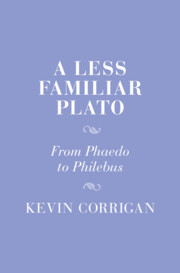Book contents
- A Less Familiar Plato
- Cambridge Studies in Religion and Platonism
- A Less Familiar Plato
- Copyright page
- Contents
- Acknowledgments
- Abbreviations
- Introduction
- Part I Embodiment and Participation in the Divine
- Part II Introduction to the Republic and Philebus
- Part III Introduction to Love, Myth, Erotikē Technē, and Generative Epistēmē
- Appendix Scientific Perception or Sharp Seeing in the Middle and Late Dialogues
- Primary Texts
- General Bibliography
- Index
Introduction
Published online by Cambridge University Press: 26 October 2023
- A Less Familiar Plato
- Cambridge Studies in Religion and Platonism
- A Less Familiar Plato
- Copyright page
- Contents
- Acknowledgments
- Abbreviations
- Introduction
- Part I Embodiment and Participation in the Divine
- Part II Introduction to the Republic and Philebus
- Part III Introduction to Love, Myth, Erotikē Technē, and Generative Epistēmē
- Appendix Scientific Perception or Sharp Seeing in the Middle and Late Dialogues
- Primary Texts
- General Bibliography
- Index
Summary
Plato is often represented as an essentialist thinker who believed in abstract entities known as the Forms, a thinker who privileged universals over particulars, thought over sensation, the disembodied soul or mind over both the embodied mind and the body, and who rejected art in favor of censorship and rigid authoritarianism. This book argues for a rather different understanding – a less familiar Plato for many in the modern world – a Plato who believes in Forms but is not an essentialist in any abstract or simple universalist way.1 This “less familiar Plato” thinks in new ways about thought models but develops a positive, scientific view of perception in the middle and late dialogues (before Aristotle), offers positive models of art and science that need to be evaluated together with the critique he provides in the Republic and maintains in the Laws, and articulates a broader view of intelligible reality within which the mind–soul–body continuum has an eidetic structure and in which even failure and the imperfect are included. This less familiar Plato develops an ideal and yet finely layered view of friendship and love that provided throughout antiquity a practical guide. He does not so much split the disembodied from the embodied mind as see both as forming a dynamic, coextensive continuum with a model of separation in life before death. He thinks of the problem of classification, so important for the development of modern scientific thinking, in new ways and provides a depth framework for understanding fundamental issues connected with what we today regard as problems of ecology and sustainability. Above all, Plato provides posterity with a framework for understanding and articulating the mystical imagination, ranging from what we might call the intellective imagination to the vision and touch of the beautiful and the good – which are not abstract principles open only to the educated but the invisible religious and philosophical bases of life.
- Type
- Chapter
- Information
- A Less Familiar PlatoFrom Phaedo to Philebus, pp. 1 - 8Publisher: Cambridge University PressPrint publication year: 2023

